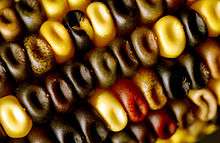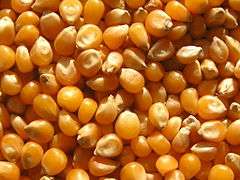Corn kernel



Corn kernels are the fruits of maize. Maize is a grain, and the kernels are used in cooking as a vegetable or a source of starch.
One ear of corn contains roughly 800 kernels in 16 rows. One hundred bushels of corn can contain upwards of 7,280,000 kernels.
Corn is a popular food throughout the world in many forms. It is used in breakfast cereals in the Western world (as corn flakes) and it is a grain that can be eaten raw off the cob, although it is usually preferred cooked. In the United States, for economic reasons such as government subsidies, corn is the basis of many products, in the form of high fructose corn syrup, in favor of cane sugar.

The kernel of maize consists of a pericarp (fruit wall) fused to the seed coat. This type of fruit is typical of the grasses and is called a caryopsis. Maize kernels are frequently and incorrectly referred to as seeds. The kernels are about the size of peas, and adhere in regular rows round a white, pithy substance, which forms the ear. The kernels can be of various colors: blackish, bluish-gray, purple, green, red, white and yellow. When ground into flour, maize yields more flour, with much less bran, than wheat does. It lacks the protein gluten of wheat and, therefore, makes baked goods with poor rising capability.
A genetic variant that accumulates more sugar and less starch in the ear is consumed as a vegetable and is called sweet corn.
Corn kernels are readily available in bulk throughout maize-producing areas. Transportation and packaging of dried clean corn kernels to non-producing areas adds to the cost.
Biofuel
Corn kernels are used as pelletized fuel for pellet stoves and furnaces. Corn kernels are a natural pellet, which gives them an economic advantage over other man-made biomass pellets and wood pellets.
The use of corn and other grains as a renewable biofuel may have environmental and cost benefits, compared to other energy source, and may create additional forms of revenue for farmers and other economic industries. However, the use of corn as a fuel stock may increase the price of corn and have adverse effects on corn as a food stock. It should also be noted that, although it is assumed that biofuels have a small carbon footprint and are therefore more environmentally friendly than other fuel sources, their production and distribution may actually have greater environmental impact than fossil fuels.[1]
